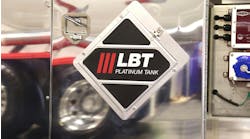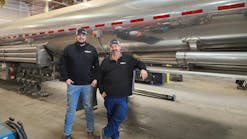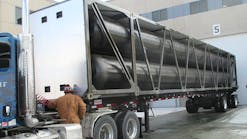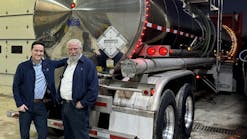On-board systems help eliminate costly errors leading to retained product in petroleum tank trailers
TANK transports are still operated by human drivers, and unless fuel delivery becomes completely automated, there is still the distinct possibility that human error can occur in each delivery. This is not to place blame on drivers, but it is the truth of the matter.
When making an average of 3,650 fuel deliveries in a given year, each trailer presents plenty of opportunities for any number of fuel-delivery issues to arise, even for the most diligent and experienced employees.
Accuracy and safety are at risk of being compromised when the loading and unloading process relies on analog and manually operated equipment and systems. Despite innovations in equipment, many trucks are still using these technologies. Driver training and vigilance are important to safeguard against common errors, but digital management of tank functions is a more reliable method.
One specific error—fuel retain—can yield several unfavorable results, including mixed product, shortages, disputed delivery amounts, and tank overfill. A digital interface won’t replace workers, but it can assist their ability to make retain-free deliveries and avoid these consequences.
Retain causes
There are many possible causes to consider when looking at a retain condition, including a loss of air pressure in the trailer, causing the valve to close before the compartment is completely empty; a driver forgetting to unload a compartment; an unlevel trailer “heel,” preventing all product from draining; and a driver closing the compartment too early.
When retain occurs, a potential overfill situation is created, along with the chance of product crossover or cross-contamination. Retain has been known to happen approximately once in every 125,000 deliveries, with only one in every 24,000 cases identified during loading and not delivered. The current safeguard against this error involves a bucket test after unloading, but this can be unreliable since an empty hose or pipe does not necessarily mean a totally empty fuel compartment.
Delivery disputes
Fuel-delivery studies show that one out of every 4,000 deliveries will result in the recipient of the fuel questioning whether or not the indicated amount of fuel has actually been delivered. The causes and effects—and current method of possible mitigation—are the same here as in a mixed-product scenario.
What makes this error even more detrimental, however, is the potential damage that can be caused to the relationship between the fuel-delivery company and the retailer. If this error occurs too often, it can cause permanent damage to relationships and ultimately result in the site operator looking for a new fuel supplier.
This error—which happens in one of every 24,000 deliveries—results when a fuel compartment is not completely emptied due to an unlevel delivery location, premature closing of the fuel compartment or loss of air pressure during the unloading process.
Product overfills are both dangerous and costly as they can harm the environment and create a possible fire hazard, potentially resulting in fines. The current safeguard against overfill is the installation of retain probes in the fuel compartments, but they are currently used on only about 20% of fuel trailers in the United States. In addition, this retain warning is typically only noticed at the loading terminal when the driver is notified of the retain condition created from the prior delivery.
Key factor
Eliminating retained product at the point of delivery is key, and legacy systems only notify the driver after the fact. To defend against the most prevalent causes, and the disastrous results, of a retain condition, electronic systems are in development that will unify tank-truck monitoring, reporting and error prevention operations. Smart, digital systems for petroleum trailers institute failsafe measures that ensure that the driver will be notified of a retain condition at the point of delivery and not after. The system will also log empty or retain events within the system memory.
Digital systems make each driver more informed and in tune with their tank equipment. One such system, CivaCommand by Civacon, Hamilton, Ohio, consists of an array of sensors and touchscreen mounted to the undercarriage of a tank trailer next to the bottom-loading adaptors. These sensors, which monitor the position of valves, air pressure and each compartment’s wet or dry status, are located above each tank compartment to ensure the compartment has been fully unloaded. LEDs allow drivers and techs to see if there is any fuel retained in a compartment, a mistake that could lead to disputes or fuel mixing.
New age digital tank trailer systems also manage air controls to keep compartments locked when not in use. Ultimately, these systems simplify the loading and unloading process for drivers through touchscreen commands and digital communication between components. Minimal driver training is required to master this kind of interface.
Apart from drivers, retail customers can also appreciate a more error-free process, as filling up with compromised or incorrect fuel can do damage to their engines and require expensive repairs resulting from vehicle breakdowns. Fuel-station operators also experience the benefits of a trusting relationship with distributors and their clientele when the proper fuel is reliably dispensed.
Drivers are an integral part of the fuel-delivery chain, but even the most conscientious and knowledgeable ones can cause retain conditions occasionally. Uncertainty and human error no longer have to be part of the job, and new technology is giving transporters more choice in the matter.
Randy Robinson is Engineering Manager for Civacon, Hamilton, OH. He can be reached at (800) 560-6601, or [email protected].









